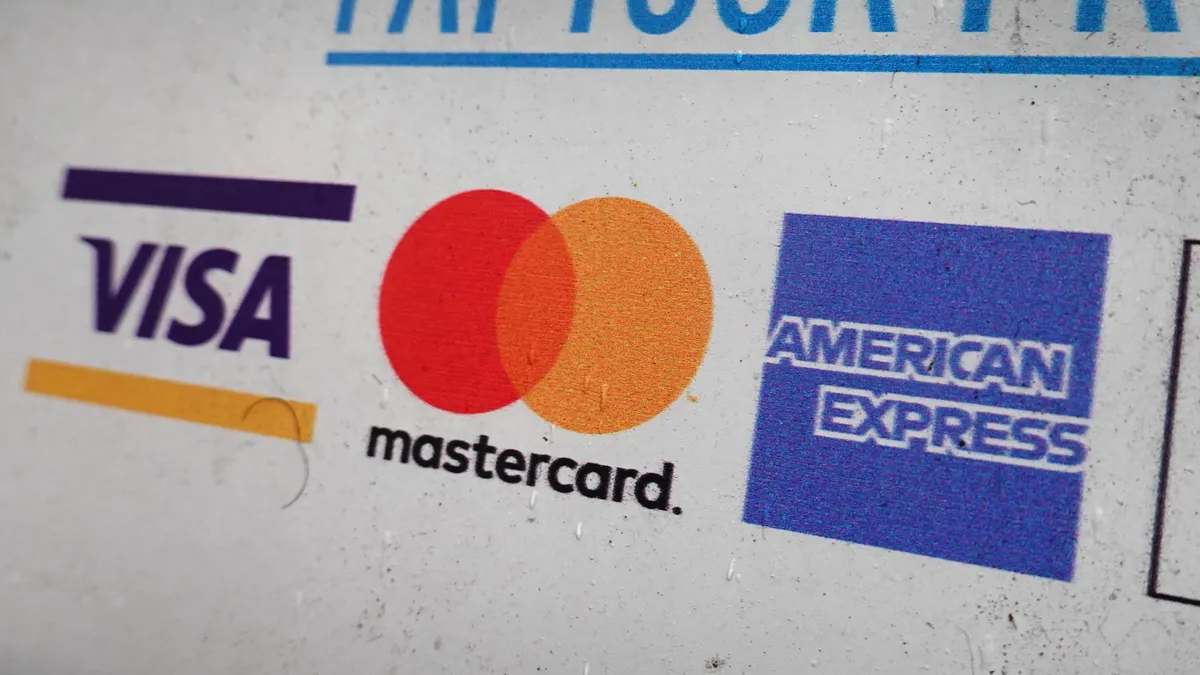Dive Brief:
- Fourth-quarter consumer credit card balances last year climbed $61 billion, or 6.6%, over the prior quarter to $986 billion, surpassing a pre-pandemic high of $927 billion, according to the Federal Reserve Bank of New York’s Center for Microeconomic Data. That $61 billion increase was the largest gain since the Fed began recording the data in 1999.
- Compared to December of 2021, the credit card balances at the end of last year were $130 billion higher, which was the largest annual growth in such balances, the Fed said. Meanwhile, credit card debt delinquencies of 90 days or more were also on the rise, increasing to 4.01% in Q4 2022, up from 3.2% in the year-earlier quarter, according to the Fed.
- An analysis from the New York Fed’s Liberty Street Economics blog found that younger borrowers have higher credit card debt than older borrowers. Delinquency rates for consumers in their 20s, 30s and 40s were higher than those in their 50s, 60s and 70s.
Dive Insight:
In its analysis, the blog speculated that worsening delinquency rates may be due to an increase in interest rates, higher inflation and a return to pre-pandemic patterns. The decline could also possibly be related to a deterioration in underwriting standards, the blog said.
The fact that younger borrowers are struggling to repay their credit card and auto loans even while federal student loan repayments have been paused is a concern because repayment on the student loan obligations is planned to resume later this year, the post noted.
“Credit card balances grew robustly in the 4th quarter, while mortgage and auto loan balances grew at a more moderate pace, reflecting activity consistent with pre-pandemic levels,” Wilbert van der Klaauw, economic research advisor at the New York Fed, said in a statement. “Although historically low unemployment has kept consumer’s financial footing generally strong, stubbornly high prices and climbing interest rates may be testing some borrowers’ ability to repay their debts.”
One could argue that the rise in credit card debt and delinquencies comes as no surprise, given an increase in credit card demand and former credit reporting agencies delinquency forecasts.
A November report from the New York Federal Reserve Bank found that 27.1% of consumers applied for a credit card during the previous 12 months as of October, up from 26.5% in 2021. The Fed also found at that time that the rejection rate for credit card applications dropped by 2.4 percentage points to 18.5%.
About a month later, TransUnion released a forecast predicting that financial institutions would only originate 80.9 million credit cards this year, down from 2022. The report also noted that more than half of consumers felt their incomes weren’t keeping pace with inflation, and over eight in 10 cited inflation as one of their top three financial concerns over the next six months.
Meanwhile, credit card companies are seeing a rise in consumers unable to pay off their debts. Discover Financial Services said in a February SEC filing that its charge-off read reached 2.81% in January, an increase from 2.54% in December and 2.46% in November. In a separate filing, Synchrony Financial also said its net charge-off rate rose to 4.2% in January, compared to 3.5% in December.
As credit card companies watch the demand for their products and overall delinquency rates rise, they also face scrutiny from regulators and lawmakers.
Earlier this month, the Consumer Financial Protection Bureau proposed amending the Credit Card Accountability Responsibility and Disclosure Act to prohibit companies from charging more than $8 per payment in late fees, or more than a quarter of the minimum monthly payment amount. The agency estimated that U.S. households pay roughly $12 billion in late fees annually, but that rule change could cut that figure down around $9 billion.
Centering attention on the Visa-Mastercard duopoly, Senator Dick Durbin (D-IL) introduced the Credit Card Competition Act bill, which require that merchants have access to credit card networks other than Visa and Mastercard for routing transactions, but the bill did not pass last year. Senator Durbin said he planned to reintroduce the bill this year.










